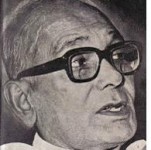Journalists and politicians—Part II

JP of the Devnagiri Script
Print the English journal in the Devnagiri script. Now then what was that? That was JP as chairman of the English weekly Everyman’s asking his editors – way back in 1974 – to print one sixth of the English weekly in the Devnagiri script. He directed that the language of the weekly would continue to be English but the script for one-sixth of the pages would be Devnagiri.
The editors expressed disagreement but relented on JP’s personal request. However, before JP’s suggestion could be implemented, Indira Gandhi imposed the emergency and press censorship and the weekly folded up.
Recently, I chanced upon my friend and fellow public relations practitioner, Irfan Khan, who was then with Everyman’s, which was published from
Sensing this proposal would not readily appeal to the editors, JP said:"Even though this idea might appear queer or impractical, I personally thinkthere is a great deal of scientific reasoning on Vinobaji’s side. Except for theRoman script as used in French, Italian or German, all other scripts, such asArabic, Persian, Chinese or Japanese, are most unscientific. (English‑speaking peoples use the Roman script in an utterly anarchic fashion. Vinobaji often gives the common example of the two English words, ‘but’ and ‘put’. The examples can easily be multiplied.) Devnagiri, on the other hand, is far more scientific than the others, though certain sounds that do not occur in Sanskrit or Hindi, will have to be symbolised either by adding new letters to the Nagari alphabet or by suitable diacritical marks."
JP then goes on to add: "Vinobaji is looking far into the future – not in the fashion of a dreamer but in that of a rigorous logician and scientist. Thus he thinks that ultimately there will be left only two scripts in the world: Roman and Nagari."
And here comes JP’s directive: "Be that as it may. To cut the story short, I have made a commitment to Vinobaji that one-sixth of the pages of Everyman’s will be printed in the Nagari script as suitably adapted to express English sounds. The language, of course, will continue to be English."
Irfan says Suman and he discussed and pondered at length over JP’s letter. Eventually it was decided that Suman would reply on behalf of them both. In the course of his letter, Suman said: "I was intrigued by your suggestion in the letter about printing a part of Everyman’s in the Devnagiri script. I have no say in this matter, of course, but since you wrote about it I am taking the liberty of putting down my first response.
"I am not very sure that it is a good idea. The trend, worldwide, it seems to me, is in the other direction, towards using the Roman script to write national languages. This has the attendant advantage of a person having to know just one script for a lot of languages and I think it is important to keep in view the long term when there might be just one script throughout the world."
Suman went on to add: "Countries which have done this have, to my Down Memory Laneknowledge, benefitted greatly. The Turks did it under Attaturk.
Irfan says this debate went on for some time until one day JP telephoned Irfan from
Irfan also reminisced on JP’s book: Prison Diary. Irfan says JP wrote, in long hand, his prison diary. When orders came for JP’s release in
A couple of months later, JP asked Irfan for the manuscript, which was later published in book form under the title: Prison Diary.
April 1986
Contact: hiroshroff@hotmail.com






